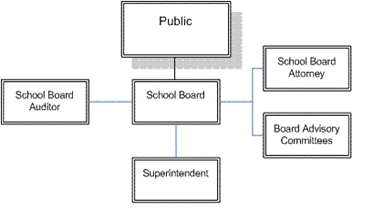Why Does a School District Need an Internal Audit Function?
To Assess whether management has met its responsibilities in complying with:
- Regulations
- Laws
- Policies
- Procedures
- Contracts and agreements
To identify areas where:
- Economy and efficiency could be improved, thereby reducing cost and/or liability to the District
- Losses of assets and taxpayer funds can be prevented
- Human resources can be better utilized
How and Why is the School District Internal Auditor Independent?
- Independence is paramount in performing the internal audit function, since it provides for an atmosphere for objective and uninhibited appraisal.
- The Internal Auditor reports to the Board of Education.

What does the School District Internal Auditor Do?
- Determines efficiency and effectiveness
- Determines compliance
- Evaluates the adequacy and effectiveness of internal controls
- Investigates matters related to thefts, frauds and other irregularities
What is Internal Audit?
Internal Auditing is an independent, objective assurance and consulting activity designed to add value and improve an organization’s operations. It helps an organization accomplish its objectives by bringing a systematic, disciplined approach to evaluate and improve the effectiveness of risk management, control, and governance processes.
How Does an Area Get Selected for an Audit?
- Level of Identified or Inherent Risk
- Quality of Controls
- Flow of Funds
- Asset Liquidity
- Public Disclosure Implications
- Board/Superintendent/Management Interest
- Complexity of Operations
- Qualitative Aspects of Management
- Changes in Systems, Processes or Procedures
What Takes Place in an Internal Audit?
- Planning
- Data Gathering – Interviewing
- Testing
- Summarizing
- Evaluating
- Reporting
- The Culmination of fieldwork results in a draft audit report which includes:
- Purpose
- Scope
- Background
- Overall Evaluation, Findings and Recommendations
Findings are instances of noncompliance with laws and regulations, internal control weaknesses, and areas where economy and efficiency can be improved.
- The draft audit report is presented to the auditee for discussion.
- The auditee is allowed a time period to provide a written reply to the findings and recommendations.
- Once the response is received, the response is incorporated in the body of the report.
- The final audit report is then provided to the Board of Education and the Superintendent.
What Occurs After an Audit by the School District Independent Auditor?
- After the audit is issued, a follow-up is performed to ascertain the status of the recommendations.
- The follow-up is handled in the same manner described above for an audit
What is the Difference Between an Internal Auditor and an External Auditor?
The roles of the internal and external auditors differ substantially and provide very different types of assurance to the audit committee and management, namely:
- Internal auditors review and test controls at a significantly lower lever of materiality than do external auditors and often review a much broader range of risks than those for external financial reporting.
- External audits are designed to report on historical data, whereas internal audits are generally focused on the efficiency and effectiveness of current and future operations.